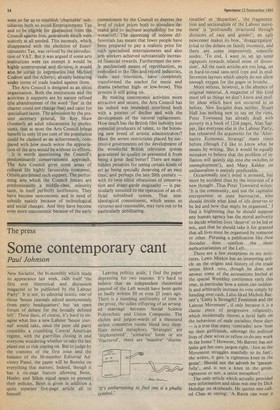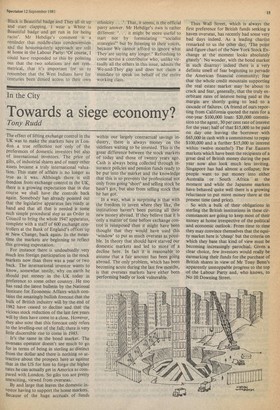Some contemporary cant
Paul Johnson
New Socialist, the bi-monthly which made its appearance last week, calls itself 'the first ever theoretical and discussion magazine to be published by the Labour Party'. It is not, its editorial insists, one of those 'house journals edited anonymously from party headquarters' but 'an open forum of debate for the broadly defined left'. These days, of course, it's hard to imagine what line a new Labour 'house journal' would take, since the poor old party resembles a crumbling Central American regime, with the guerrillas closing in and everyone wondering whether to take the last plane out or risk staying on. But to judge by the contents of the first issue and the balance of the 30-member Editorial Advisory Panel, the paper will be Bennite on everything that matters. Indeed, though it has a six-page feature allowing Benn, Healey and Silkin equal space to present their policies, Berm is given in addition a quite separate five-page article all to himself. Leaving politics aside, I find the paper depressing for two reasons. It's hard to believe that an independent theoretical journal of the Left would have been quite so badly written 50 or even 25 years ago. There is a numbing uniformity of tone in the prose, the sullen offspring of an arranged marriage between Social Science Polytechnic and Union Composite. The cliches and jargon-words of a thousand airless committee rooms blend into shopfloor mixed metaphors. 'Strategies' are 'implemented', 'scenarios' loom or are 'fractured', there are 'rnassive"discon tinuities' or 'disparities', 'the fragmentation and sectionalism of the Labour movement' is 'profoundly structured through divisions of race and gender'; an ugly newcomer makes its bow, 'clisaggregation' (vital to the debate on family incomes), and there are some impressively soporific asides: 'To end, I want to set up some signposts towards related areas of discussion'. All the main articles are too long, set in hard-to-read sans-serif type and in midSeventies layouts which simply do not allow enough oxygen for the pages to breathe.
More serious, however, is the absence of original material. A magazine of this kind must tell us things we don't know and proffer ideas which have not occurred to us before. New Socialist does neither. Stuart Hall has nothing new to say on the riots, Peter Townsend has already dealt with poverty in a book of 1216 pages, Alan Sapper, like everyone else in the Labour Party, has rehearsed the arguments for the 'Alternative Economic Strategy' many times before (though I'd like to know what he means by writing: 'But it would be equally mistaken to believe that the problem of inflation will quietly slip into the switches to unemployment'), and Mary Kaldor on unilateralism is entirely predictable.
Occasionally one's mind is aroused, but more by accident than by the intrusion of a new thought. Thus Peter Townserd writes: 'It is the community, and not the capitalist entrepreneur or state bureaucrat, who should decide what kind of ilfe deserves to be led and how that might be organised.' I find it frightening that he should suppose any human agency has the moral authority to decide whether lives 'deserve' to be led or not, and that he should take it for granted that all lives must be organised by someone or other. Perusing a publication like New Socialist does confirm the sheer authoritarianism of the Left.
There are a few exceptions to my strictures. Lewis Minkin has an interesting article on the origins and history of the trade union block vote, though he does not answer some of the accusations hurled at the special Wembley conference early this year, in particular how a union can suddenly and arbitrarily increase its vote simply by handing over cash. I also liked Michele Barrett's 'Unity is Strength? Feminism and the Labour Movement', if only because it is a classic piece of progressive religiosity, which incidentally throws a lurid light on the behaviour of male socialists these days — is it true that many 'comrades' now 'beat up their girlfriends, sabotage the political lives of their wives or refuse to do any work in the home'? However, Ms Barrett has not quite got her own jargon right. 'Just as the Movement struggles manfully to its feet', she writes, it gets 'a righteous knee in the groin'. Should not the adverb be 'personfully', and is not a knee in the groin, righteous or not, a sexist metaphor?
The only article which actually provided new information and ideas was one by Dick Hebdige on skinheads. He quotes one called Chas as saying: 'A Rasta can wear a Black is Beautiful badge and They all sit up and start clapping. I wear a White is Beautiful badge and get run in for being racist'. Mr Hebdige's comment is a reminder that middle-class condescension and the housemasterly approach are still at home in the Labour Party: 'Of course, I could have responded to this by pointing out that the two solutions are not symmetrical, that it's important for us to remember that the West Indians have for centuries been denied access to their own ethnicity . . .'. That, it seems, is the official party answer. Mr Hebdige's own is rather different: . . it might be more useful to start not by formulating "socialist strategies" but by listening to their voices, because We cannot afford to ignore what They are saying any longer.' Refreshing to come across a contributor who, unlike virtually all the others in this issue, admits the We-and-They gap and does not claim a mandate to speak on behalf of the entire working class.

































 Previous page
Previous page